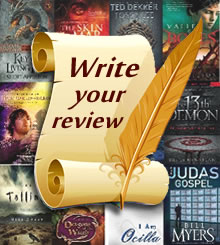More Thoughts On Reviews
 I remember the first time a writer asked me to post a review of their book on Amazon. I was terrified. Seriously! I mean, what did I know about writing reviews? And other people–strangers–would read what I said about someone else’s book? It was beyond intimidating, but I soldiered through.
I remember the first time a writer asked me to post a review of their book on Amazon. I was terrified. Seriously! I mean, what did I know about writing reviews? And other people–strangers–would read what I said about someone else’s book? It was beyond intimidating, but I soldiered through.
These days I’ve grown comfortable writing reviews, and yet I realize there are other readers who are still like I used to be. Consequently, they keep their opinions to themselves. Others, perhaps, have never seen the need to write reviews of the books they enjoy.
Listening to writers, I have come to the conclusion that receiving reviews makes a huge difference in how wide an audience a book reaches. Reviews, like blog tours, are replacing the back-yard buzz or the water-cooler chat that used to give one person a chance to tell others about the book they’d read and loved.
This is good news actually. In this era of the communication revolution, one person’s opinion reaches far more people today than fifteen, twenty years ago. In other words, stating your opinion has the potential to carry more influence than ever before.
Still, some people remain intimidated by the whole process. Since Spec Faith has added the review component to our library, I thought it might be helpful to look at writing reviews briefly, in the hopes that more readers will brave the waters of influence and post their thoughts here and elsewhere on the web.
First, what a review is not (or ought not to be).
- A review is not a slam. A person writing a review should not vilify either the book or the author.
- A review is not a sales pitch. At the same time, a reviewer is not a shill and should not praise the book for the sole purpose of pushing sales.
- A review is not generic. No one benefits from a review that could fit any book whatsoever.
- A review is not a novel. I admit I have trouble here, but the truth is, if a review goes on and on and on, people are less likely to read it–or read all of it. Consequently, it loses some of its impact.
- A review is not a synopsis. Generally what the story is about is available as part of the book description, so a detailed recap isn’t necessary. In addition, readers who don’t want to know the surprises or ending of a book may inadvertently learn more than they wish if a review simply retells the story.
Then what is a review?
- A review is an opinion, with reasons.
Yep, that’s pretty much it. Of course, there are good reviews and there are … other ones.
A good review, in my opinion, is balanced. Rarely are books all good or all bad, and yet one particular aspect of a story can color our views. Harry Potter is a quick and convenient example. Some people hearing that the stories were about wizards allowed that fact to color their view of the books, and they looked no further. So too for reviewers–there might be one aspect of the story or writing that caused them to feel strongly one way or the other.
I don’t think that’s bad or wrong or that a reviewer should shy away from telling such a fact. However, it’s good to be aware that not everyone will respond in the same way. Consequently, the kind of review that is most helpful doesn’t camp on just one aspect of a book–the one that caused the reviewer to love it or to hate it.
A balanced review, then, points out things that the reader liked and things they might have liked better: I liked the main character because she seemed real, but I would have liked the story better if there wasn’t so much description.
One more vital thing to remember about a balanced review. In writing the parts that are critical, it’s important to be gracious and fair. Ephesians 4: 15-16 gives us a model to follow: “But speaking the truth in love, we are to grow up in all aspects into Him who is the head, even Christ, from whom the whole body, being fitted and held together by what every joint supplies, according to the proper working of each individual part, causes the growth of the body for the building up of itself in love.”)
In my opinion, a good review also takes into consideration for whom the book was intended. If a review said, “The story was juvenile” about The Three Little Pigs, he would, of course, be right. But being “juvenile” isn’t a bad thing for a story whose audience is, in fact, juveniles.
Finally, a good review will give a reader recommendation. Who, in your opinion, will most like this book? It’s just the reviewer’s opinion, so there’s no right or wrong. But what a help for readers looking for the kinds of books they want to read!
Covers, titles, endorsements, back cover copy, even first pages can be deceptive, but if a review, and especially if multiple reviews, by readers who have finished the book, say it is perfect for a certain audience, then chances are the recommendation will sway those looking for that particular type of story.
So there you have it. Now what’s holding you back from submitting your reviews of Spec Faith library books? (I hope you’re saying, What, indeed? I need to write a review this very minute, so be on the look out for it! )
– – – – –
This feature is a reprint from a previous Spec Faith post.










































Good points, Becky. Good stuff.
I wrote a blog post back in August of 2012 that segues into this.
How to Identify and Write Honest Reviews
I think it’s important for us to keep talking about this, Rick, especially if we want readers to post reviews here at Spec Faith. And I’d certainly like to see that. The more reviews a book gets, the more information readers have to make a decision whether or not they want to pick up that particular novel.
Becky
I have to admit that the “review is not a novel” part I have trouble with too. It is hard to not discuss points you want to make that COULD be trimmed. Especially me, who likes philosophy, and wants to discuss ideas, it can be frustrating. I have to remember that my review is designed to praise or critique (ideally both) a book. That book and the author are important, not me.
Rebecca,
Thanks for this article. I have been in a state of being one of those intimidated folks. I have a book sitting in my room that was sent to me to “review” from a stranger. I want to give an honest review, though it is not a book that I would normally pick up. Now I know more about how to go about doing this. Thanks again for posting this. I have really enjoyed reading both your and Stephen’s posts. I also live in the Austin area and am a wanna be writer, pursuing this passion in my off-time as a teacher. Trying to stick to being true to who I am with what my critique should contain and this information helps me quite a bit.